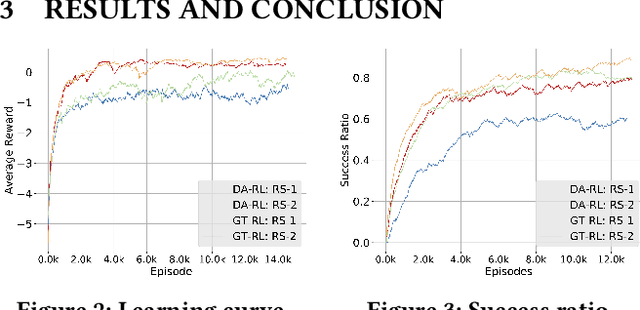Kelly Merckaert
A Task-Efficient Reinforcement Learning Task-Motion Planner for Safe Human-Robot Cooperation
Oct 14, 2025Abstract:In a Human-Robot Cooperation (HRC) environment, safety and efficiency are the two core properties to evaluate robot performance. However, safety mechanisms usually hinder task efficiency since human intervention will cause backup motions and goal failures of the robot. Frequent motion replanning will increase the computational load and the chance of failure. In this paper, we present a hybrid Reinforcement Learning (RL) planning framework which is comprised of an interactive motion planner and a RL task planner. The RL task planner attempts to choose statistically safe and efficient task sequences based on the feedback from the motion planner, while the motion planner keeps the task execution process collision-free by detecting human arm motions and deploying new paths when the previous path is not valid anymore. Intuitively, the RL agent will learn to avoid dangerous tasks, while the motion planner ensures that the chosen tasks are safe. The proposed framework is validated on the cobot in both simulation and the real world, we compare the planner with hard-coded task motion planning methods. The results show that our planning framework can 1) react to uncertain human motions at both joint and task levels; 2) reduce the times of repeating failed goal commands; 3) reduce the total number of replanning requests.
Distributed Reinforcement Learning for Cooperative Multi-Robot Object Manipulation
Mar 21, 2020

Abstract:We consider solving a cooperative multi-robot object manipulation task using reinforcement learning (RL). We propose two distributed multi-agent RL approaches: distributed approximate RL (DA-RL), where each agent applies Q-learning with individual reward functions; and game-theoretic RL (GT-RL), where the agents update their Q-values based on the Nash equilibrium of a bimatrix Q-value game. We validate the proposed approaches in the setting of cooperative object manipulation with two simulated robot arms. Although we focus on a small system of two agents in this paper, both DA-RL and GT-RL apply to general multi-agent systems, and are expected to scale well to large systems.
* 3 pages, 3 figures
 Add to Chrome
Add to Chrome Add to Firefox
Add to Firefox Add to Edge
Add to Edge